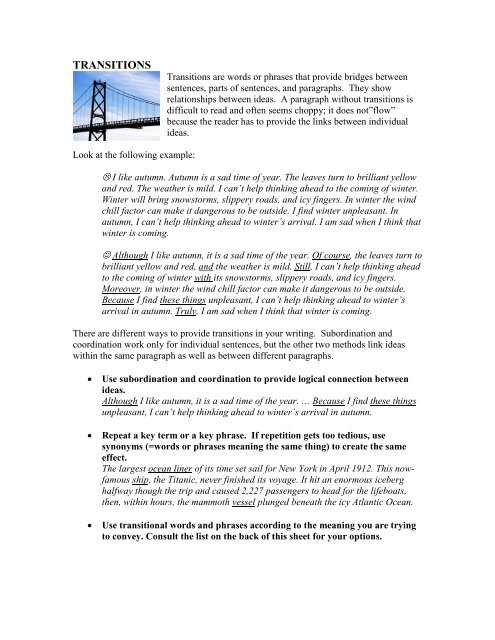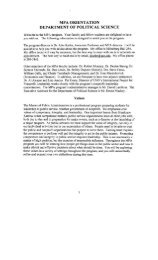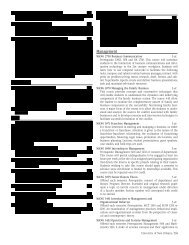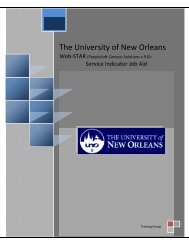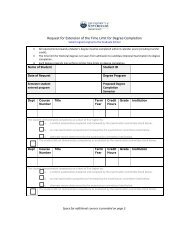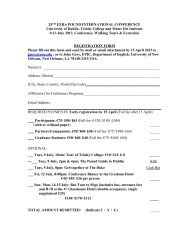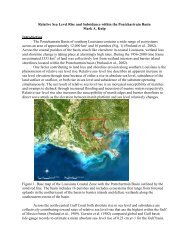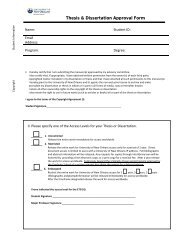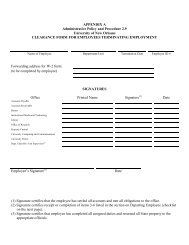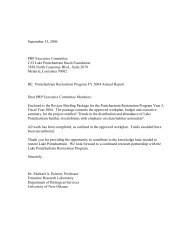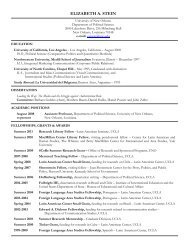Using Transitions
Using Transitions
Using Transitions
Create successful ePaper yourself
Turn your PDF publications into a flip-book with our unique Google optimized e-Paper software.
TRANSITIONS<br />
<strong>Transitions</strong> are words or phrases that provide bridges between<br />
sentences, parts of sentences, and paragraphs. They show<br />
relationships between ideas. A paragraph without transitions is<br />
difficult to read and often seems choppy; it does not”flow”<br />
because the reader has to provide the links between individual<br />
ideas.<br />
Look at the following example:<br />
I like autumn. Autumn is a sad time of year. The leaves turn to brilliant yellow<br />
and red. The weather is mild. I can’t help thinking ahead to the coming of winter.<br />
Winter will bring snowstorms, slippery roads, and icy fingers. In winter the wind<br />
chill factor can make it dangerous to be outside. I find winter unpleasant. In<br />
autumn, I can’t help thinking ahead to winter’s arrival. I am sad when I think that<br />
winter is coming.<br />
Although I like autumn, it is a sad time of the year. Of course, the leaves turn to<br />
brilliant yellow and red, and the weather is mild. Still, I can’t help thinking ahead<br />
to the coming of winter with its snowstorms, slippery roads, and icy fingers.<br />
Moreover, in winter the wind chill factor can make it dangerous to be outside.<br />
Because I find these things unpleasant, I can’t help thinking ahead to winter’s<br />
arrival in autumn. Truly, I am sad when I think that winter is coming.<br />
There are different ways to provide transitions in your writing. Subordination and<br />
coordination work only for individual sentences, but the other two methods link ideas<br />
within the same paragraph as well as between different paragraphs.<br />
• Use subordination and coordination to provide logical connection between<br />
ideas.<br />
Although I like autumn, it is a sad time of the year. … Because I find these things<br />
unpleasant, I can’t help thinking ahead to winter’s arrival in autumn.<br />
• Repeat a key term or a key phrase. If repetition gets too tedious, use<br />
synonyms (=words or phrases meaning the same thing) to create the same<br />
effect.<br />
The largest ocean liner of its time set sail for New York in April 1912. This nowfamous<br />
ship, the Titanic, never finished its voyage. It hit an enormous iceberg<br />
halfway though the trip and caused 2,227 passengers to head for the lifeboats,<br />
then, within hours, the mammoth vessel plunged beneath the icy Atlantic Ocean.<br />
• Use transitional words and phrases according to the meaning you are trying<br />
to convey. Consult the list on the back of this sheet for your options.
Adding<br />
and, besides, in addition, also, too, moreover, further, furthermore, next, first,<br />
second, third, finally, last, again, and then, likewise, similarly<br />
Comparing<br />
similarly, likewise, in like manner, at the same time, in the same way<br />
Contrasting<br />
but, yet, however, still, nevertheless, on the other hand, on the contrary, in<br />
contrast, conversely, in another sense, instead, r4ather, notwithstanding,<br />
though, whereas, after all, although<br />
Emphasizing<br />
indeed, in fact, above all, add to this, and also, even more, in any event, in<br />
other words, that is, obviously<br />
Ending<br />
after all, finally, in sum, for these reasons<br />
Giving examples<br />
for example, for instance, to illustrate, that is, namely, specifically<br />
Pointing to cause and effect, proof, or conclusions<br />
thus, therefore, consequently, because of this, hence, as a result, then, so,<br />
accordingly<br />
Showing place or direction<br />
over, above, inside, next to, underneath, to the left, to the right, just beyond, in<br />
the distance<br />
Showing time<br />
meanwhile, soon, later, afterward, now, in the past, then, next, before, during,<br />
while finally, after this, at last, since then, presently, temporarily, after a short<br />
time, at the same time, in the meantime<br />
Summarizing<br />
to sum up, in brief, on the whole, as has been noted, in conclusion, that is,<br />
finally, as has been said, in general, to recapitulate, to conclude, in other<br />
words<br />
The above examples and overview come from Muriel Harris, Prentice Hall Reference<br />
Guide. 6 th ed. Upper Saddle River, NY: Prentice Hall, 2006.


